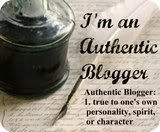As I posted yesterday, I'm currently reading Marcus Aurelius: A Life by Frank McLynn (and no, I don't keep saying that to make myself appear intellectual....incidentally, is it working?)
Anyway, I was looking at the book on Amazon so I could link it yesterday, and I saw that there were two reviews for it. One of them talked in a very detailed manner about McLynn's sources, and how he relied on some suspect ones. As anybody who reads history books knows (and, to a lesser extent, many other non-fiction genres that require sourcing), there is often controversy on the scholarship of the author's writing. Primary sources, secondary ones, apocryphal sources, etc.
Here's my question for you (and any of you who read reviews rather than write them are welcome to chime in as well):
When you are reading a book on a subject you really know nothing about (you haven't read anything else on the subject), how does that affect how you write your review? If you praise a book for the depth of research because the bibliography in the book is huge, and then you read something on the web from another scholar that takes the author to task for using bad sources, does that affect your opinion of the book?
Or do you try and keep your review to whether or not a reader might enjoy the book, not commenting on the scholarship itself (unless it's openly bad, like Alison Weir's Princes in the Tower)?
One of the most important thing about reading History books, at least for me, is that you read at least two books on a subject before you totally trust what one of the author says. Ideally, you'll read even more before forming a full opinion. Personally, what I try to do if I talk about the scholarship at all is to just mention how the book seems to the layman. I say that the book seems convincing, though I would like to read more on the subject (like I did in my review of McLynn's Richard & John book).
What do you do when you find yourself reviewing a book like this? I'd be interested in your thoughts.
And if any History book reviewer who actually is a scholar finds this post (professional publications drag them out all the time in order to review a peer's new book, usually getting somebody who is at least partially an expert on the subject), I'd love your opinion on this as well.
Subscribe to:
Post Comments (Atom)















Only slightly related, but making me think.
ReplyDeleteIt's kinda the same in fiction. As you know I'm reading the Avalon books and there is a ton of Roman and British history in there. Mostly Romans verses Brits in the fight for England during that time period. There are specific battles named and details given that I just kinda have to trust. There are no sources sited. I just have to assume that some of it is documented fact and that Bradley knows what she's talking about.
Now granted, the books themselves are obviously fiction. The main characters themselves weren't actually there. But there is still a lot of info passed out, presented as fact. And at this point I just have to have blind faith.
So in the end, my main point, here is my question to you, David:
I know that you are reading a non-fiction book and it is therefore assumed that everything you read is accurate. But let's say there are indeed a few things that are sketchy... In the end does it matter? If you enjoy the book for what it is, isn't that the main point.
As for facts themselves...
Let's say there is in depth detail about a certain event. 20 different people were there. You will have 20 different accounts of what went on. Oh the main points will mostly be agreed on. But remember, this is in depth. The fine details are totally going to very depending on who is presenting them.
And all the history book in the world, not all written from one point of view, one memory. They are a representation of a collective memory. The book you are reading is just one point of view. Those iffy sources? Yep, they probably differ in opinion and tone than the person who wrote that review.
Remember Vietnam was a police action, not a war. Just ask my high school history book.
Did I make any sense?
Thank you so much for the thoughtful comment, Karen. And don't get me started on high-school history books and how distorted they are or how much they leave out. :)
ReplyDeletePart of my response to your question is that it depends on what you are reading the books for. When you're reading historical fiction, you're reading for the pleasure of the story. You're not reading for the factual information. If the author gets something wrong, it's really not going to affect you much because you're not necessarily reading that book to "learn" anything. Most people know (sadly, not everybody) that historical fiction has to take license with the facts sometimes to make the story more interesting.
History books don't have that luxury. Yes, history books are often written with agendas, or they are written by trying to piece together various strands of information that is often up for interpretation. And many historians interpret that information differently. That's all valid and a part of the historical debate that I actually love reading about (and occasionally getting involved in, but not often).
Ultimately, when I read a history book, the ultimate goal is to enjoy reading it. But the secondary goal is to learn something, even if it's just one point of view. If the point of view is valid yet debatable, I'm happy with that. It's just part of the vigorous back-and-forth debate that I love to read.
If it's strung together on a tissue-paper thin platform of lies or supposition not supported by what we do know about the time period, however, then that bothers me. Take, for example, the whole controversy on whether Richard III killed his two nephews so he could take the British throne in the late 1400s.
I've read two books on that subject. Alison Weir's "Princes in the Tower" and Bertram Fields' "Royal Blood." Weir's book is horribly researched, at least in my opinion (http://www.amazon.com/review/R16JTOMS4HITIM/ref=cm_cr_rdp_perm).
Meanwhile, Fields' book is sort of a reply to her (and others like her, who automatically condemn Richard). I don't necessarily treat it as a history book, but just use it to illustrate Weir's shoddy reasoning (http://www.amazon.com/review/R2ZCP9W3J84KFW/ref=cm_cr_rdp_perm).
All history books are written to convince the reader that the author's point of view on the subject is the right one. Whether or not it is the right one may be debated for years to come. But when that point of view isn't valid because the author has based it on a bunch of sources that have already been widely discredited by other historians, then that point of view becomes suspect. I might enjoy reading the book (Weir does keep the reader captivated with her writing), but it fails the second test of actually informing me of something.
Wow, this has gotten long-winded (should probably just have made it a new post! LOL). Your comment definitely made sense. Did my response? :)
Your response made perfect sense.
ReplyDeleteWhen I'm ready to delve into Roman and British history I'm going to count on you to point me towards books that will both inform and hold my interest.
I guess I'll have to start reading some, then! :P
ReplyDeleteActually, I have read quite a few, though it depends on what your area of interest is. When you decide to do it, let me know and I'll see if I have any suggestions.
Ask my Dad. Though, he'll prolly send you back to school =)
ReplyDeleteI think you two know each other... Labradorman: Barron Laycock in case ya don't...
Yes, I do remember him from the Amazon boards, though I've been gone so long (and I think he was gone before me) that it's been years since we may have interacted.
ReplyDelete